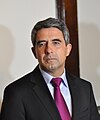Presidential and local elections in Bulgaria 2011
The 2011 presidential and local elections in Bulgaria were held simultaneously. They took place on October 23, 2011. On October 30, 2011, there was a runoff election , from which the previously favored candidate of the ruling party GERB , Rossen Plevnelev , emerged as the winner.
A total of 6.9 million eligible voters were called upon to cast their votes in one of over 11,000 polling stations. In addition to Plevnelev, the former minister for regional development, the socialist opposition politician Iwajlo Kalfin ( Bulgarian Socialist Party ) and the independent candidate Meglena Kunewa had the greatest chance of victory. Georgi Parvanov was not allowed to run for two terms.
Presidential election
Candidacies
The following 18 candidates were admitted to the 2011 presidential election:
| candidate | Party / coalition |
|---|---|
| Meglena Kunewa | independent |
| Rossen Plevneliev | GERB |
| Sali Ibrjam | National movement unity |
| Rumen Christow | Union of Democratic Forces |
| Marija Kapon | Edinna narodna partija |
| Stefan Solakov | National Front for the Rescue of Bulgaria |
| Ivajlo Kalfin | Bulgarian Socialist Party |
| Wolen Siderow | Party Ataka |
| Alexey Petrov | independent |
| Nikolay Nentschew | BSNS |
| Atanas Semow | Order, security and justice |
| Pavel Chernev | Party of the people from the people |
| Dimitar Kuzarov | independent |
| Krassimir Karakachanov | VMRO-BND |
| Andrei Chobanov | BDO |
| Nikolay Wasilew | independent |
| Svetoslav Witkov | independent |
| Wenzislaw Josifow | independent |
Opinion polls
| Release date | Institute | Rossen Plevneliev | Ivajlo Kalfin | Meglena Kunewa | Wolen Siderow | Rumen Christow | Atanas Semow | Krassimir Karakachanov | Alexey Petrov | Svetoslav Witkov | Other |
|---|---|---|---|---|---|---|---|---|---|---|---|
| September 20, 2011 | Alpha Research | 38.5% | 23.5% | 18.4% | 4.0% | 4.0% | 2.5% | 2.2% | 1.1% | 1.0% | 4.8% |
| September 30, 2011 | Center for Analysis and Marketing ( MS PowerPoint ; 838 kB) | 30.8% | 16.1% | 9.8% | 2.3% | 3.1% | 0.3% | 1.5% | 0.3% | - | - |
| October 14, 2011 | Gallup Consulting | 29% | 21% | 11% | 2.4% | 2.4% | 1.5% | 1.3% | 0.7% | 0.8% | 2.8% |
| October 19, 2011 | Mediana | 29.8% | 23.2% | 17.1% | 4.9% | 2.5% | - | - | - | 2% | - |
Result
| candidate | Rossen Plevneliev | Ivajlo Kalfin | Meglena Kunewa | Wolen Siderow | Stefan Solakov |
|---|---|---|---|---|---|
| Result , according to the Central Election Commission | 40.11% | 28.96% | 14% | 3.64% | 2.5% |
- The remaining candidates each achieved less than 2%.
Runoff
The runoff election on October 30, 2011 decided Rossen Plevnelev with 52.6 percent of the vote for himself. Iwailo Kalfin, who was supported in the runoff election by the DPS party, received 47.4 percent of the vote.
Local elections
At the same time as the presidential elections, municipal councils, city councils and mayoral elections will take place in all 264 municipalities. In two of the four largest cities, the ruling GERB party with its incumbent mayors ( Sofia - Jordanka Fandakowa and Burgas - Dimitar Nikolow ) will compete. GERB also supports the incumbent mayor of Varna - Kiril Jordanow , who is running as an independent candidate. The largest number of candidates for the post of mayor were registered in the port city of Burgas, with 47 candidates.
GERB will provide the mayors in 14 of the 27 regional capitals: Sofia, Varna, Plovdiv, Stara Sagora, Blagoevgrad, Pleven, Ruse, Veliko Tarnovo, Silistra, Smolyan, Yambol, Burgas, Dobrich, Gabrovo. The socialists (BSP) conquered only 6 here (Widin, Wraza, Lovetsch, Razgrad, Shumen, Targovishte) and showed again that their strength is still in the countryside and in smaller towns. Candidates nominated by the Blue Coalition prevailed in Kyustendil, Montana and Pazardzhik.
Election fraud
Before the elections
A topic that was widely discussed in public and in the mass media in the run-up to the elections was possible electoral fraud in the form of vote-buying. According to Bulgarian electoral research institutes, around 30 leva (approx. 17 euros) in the country and approx. 50 leva (approx. 28 euros) in the cities were offered for a purchased vote two weeks before the elections. That is why every election commercial and every election poster was provided with the mandatory notice: "The buying and selling of votes is a crime." (Bulgarian. In the previous elections there had been extensive vote purchases. Indirect vote purchases had also become public, for example when a candidate invites the entire city district to a festival where there is free food (preferably kebabsheta - grilled minced meat). Bulgarian television reported indirect electoral fraud in a village, whereby the brother of a candidate owned the local grocery store and waived his customers' bills.
In order to prevent a control mechanism of the vote buyer by means of a photo proof of the completed ballot paper, it was legally prohibited to take cameras or cell phones with a photo function into the voting booth during the 2011 elections. Often the Roma are the target of vote buyers. In order to instruct the often illiterate Romas where to place their cross, they are sometimes given a stick of the correct length with them in the voting booth. With this all they have to do is measure from the top edge of the ballot paper how far they have to go down on the ballot paper, which is sometimes over a meter long, in order to put the cross in the “right” place.
In the run-up to the elections, there were also discussions that the candidate's election number was in the box that had to be ticked. The voter could allegedly think that he is crossing out this candidate instead of voting him. Only ballot papers on which the candidate is marked with a cross are valid, the cross must not go beyond the edge of the box, it must be done with a blue ballpoint pen. Disabled people may be accompanied by a helper. However, one helper may accompany a maximum of two people. Illiteracy is no justification for being accompanied by a helper.
In the border regions, some “elective tourism” is expected. Citizens with Bulgarian citizenship who live in neighboring countries are driven by buses to their home region at the expense of candidates in order to be able to participate in the election there. Before the election, Greece refused to set up official polling stations for the Bulgarians living there.
Almost two weeks before the elections, on October 13, 2011, a bomb attack was carried out in Sofia on the official car of the journalist Sascho Dikow (Bulgarian Сашо Диков) who was critical of the government. The car was parked in front of the journalist's apartment block, no one was injured. Since the President of the European Commission, José Manuel Barroso, was in Sofia at the time of the attack, the attack is viewed as an attempt at intimidation by strangers.
The ballot papers will only be handed out upon presentation of valid ID and will be stamped by the election commission. In order for citizens with expired identification papers to be able to participate in the election, it was advised in the weeks before the election to check the expiry date of their identification and, if necessary, to apply for a new identification document before the election. For this purpose, the responsible authorities were instructed to fully exhaust the opening times and to quickly issue a new identity card or a provisional identity document valid for the election.
During and after the elections
After the elections, several parties announced that they would sue the Constitutional Court to declare the outcome of the election invalid and to have the results cashed in. They criticized the manipulation of the elections in the capital and in a few other places. In some cases, people could either only vote for the presidential election or only for the local elections or they had to vote in two different polling stations. In some towns new ballot papers were printed during the election. In the capital Sofia, almost all election results protocols were filled in incorrectly.
Web links
- Central Electoral Commission (Bulgarian)
- Election portal from Darik Radio
- Dnevnik newspaper electoral portal
- Maybe a woman президент . derstandard.at
- Ready, Set ... Who Is Running for Bulgarian President? novinite.com, contribution to possible candidacies; Retrieved May 22, 2011
- Confusion over ballot papers in Bulgaria . tagesschau.sf.tv, accessed October 23, 2011
- Brief analysis of the local elections 2011 Konrad-Adenauer-Stiftung , Sofia regional office
Individual evidence
- ↑ vesti.bg ( Memento of the original from September 4, 2011 in the Internet Archive ) Info: The archive link was inserted automatically and has not yet been checked. Please check the original and archive link according to the instructions and then remove this notice.
- ↑ Presidential election in Bulgaria has started ( page no longer available , search in web archives ) Info: The link was automatically marked as defective. Please check the link according to the instructions and then remove this notice. at net-tribune.de, October 23, 2011.
- ↑ novinite.com
- ↑ mediapool.bg
- ↑ Rumen Christow is the candidate of the Blue Coalition (Bulgarian), Darik Radio , June 13, 2011, accessed June 18, 2011
- ↑ dnevnik.bg
- ↑ Bulgaria: Suspected Mafia boss wants to become president on Wikinews
- ↑ Atanas Semow is the candidate of the Order, Security and Justice party Dnevnik (Bulgarian), accessed June 19, 2011.
- ↑ dnevnik.bg
- ↑ dnevnik.bg
- ↑ dnevnik.bg
- ↑ ДПС обеща подкрепа за Калфин-Данаилов на втория тур , DPS promised their support for Kalfin-Danailow
- ↑ The success of unfulfilled promises . In: FAZ , October 31, 2011
- ↑ dnevnik.bg
- ↑ Almost all election protocols in Sofia are filled in incorrectly (Bulgarian)





